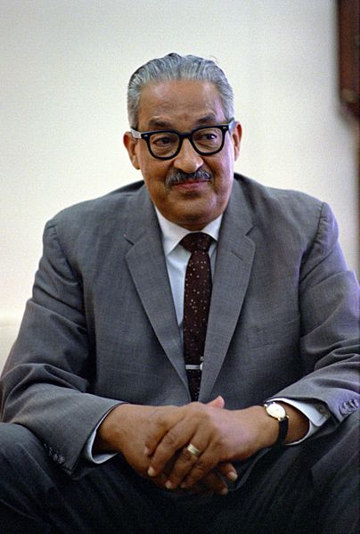|
Thurgood Marshall (1908–1993). (Wikimedia Commons) |
Few blacks born in 1908 could aspire to a career as a lawyer, much less as a member of the U.S. Supreme Court. Great grandson of a slave and son of a Pullman steward, Thurgood Marshall became a dramatic exception to the modest expectations of black Americans in the early part of the 20th century. He was born in Baltimore and attended segregated schools as a boy. After graduating from the historically black Howard University Law School, he began practicing law in 1933. In 1938, he became chief counsel of the Legal Defense Fund of the National Association for the Advancement of Colored People.
This role would soon propel him to national prominence. The NAACP Legal Defense Fund was the key legal arm of the broader struggle for justice and civil rights. By 1950, Marshall and his legal colleagues moved into high gear on a sustained attack on segregated education at all levels. Marshall began this crusade by winning important legal victories in the Supreme Court. His efforts eliminated practices in state universities and professional schools that failed to provide equal education for African-American applicants.
The biggest challenge lay ahead. Working with clients in the segregated South, Marshall was ready to attack the longstanding “separate but equal” doctrine in public schools. His struggles were both legal and political. He even faced powerful internal resistance in his own organization. Many civil rights activists believed that it was premature to take on the entire system of segregated public schools. Fearing that the Supreme Court would succumb to widespread public resistance to school integration, they urged caution. Determined to proceed, Marshall carried the day.
He and his staff of lawyers worked furiously to make the most effective case. In 1952, he presented the legal argument that eventually resulted in the landmark decision of Brown v. Board of Education in 1954. Marshall departed from traditional legal strategy by presenting the Supreme Court with persuasive evidence from the fields of psychology and social science about the effects of segregation on school children. Still, his basic argument was that no reading of the Constitution could support segregation. This victory for African-American children in the courts made Marshall a civil rights hero as well as a national figure.
In 1961, President John F. Kennedy appointed him to the U.S. Court of Appeals. In 1965, President Lyndon Johnson made him Solicitor General. Two years later, Johnson appointed Marshall to the Supreme Court, where he became the first black to occupy the position of Associate Justice. For more than 20 years, Associate Justice Thurgood Marshall voted to expand the Bill of Rights by favoring greater free expression, more restrictions on police misconduct, and increased opportunities for racial minorities, welfare recipients, and other marginal groups in American society. A long illness prompted him to retire in 1991. When asked to sum up his role as a lawyer and justice, Marshall said, “He did what he could with what he had.” For those who suffered from segregation or who had little power, no one did more.
For Further Reading
Williams, Juan. Thurgood Marshall: American Revolutionary. New York: Three Rivers Press. 1998.


